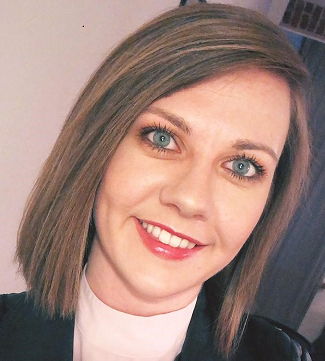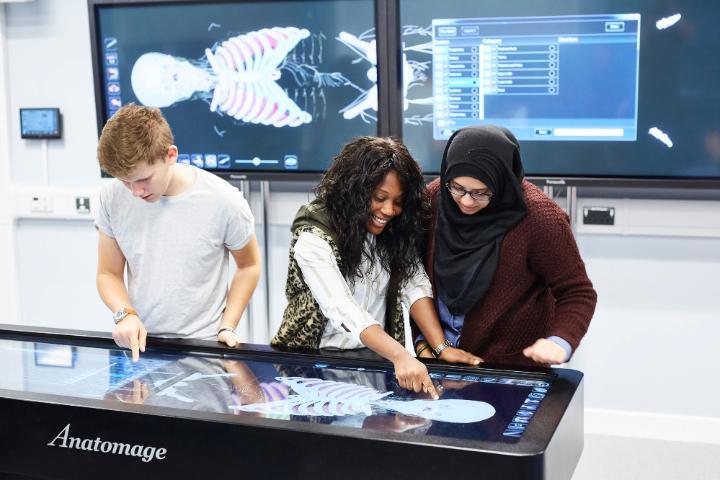Rachel Hall
BSc (Hons) Clinical Sciences graduate
- Graduated from the University of Bradford in 2016
- Is currently a Service Development Manager with MSD
- Originally wanted to be a doctor but now sees her future in her current field

Can you tell us a bit about your career journey and development since graduating from the University of Bradford?
I graduated in 2016, and after already having a gap year before starting university, I was keen to get going with my career.
I applied for lots of different scientific graduate schemes, and began working for Chase People, who are a specialist agency in the pharmaceutical sector. They gave me a role with MSD (Merck Sharp & Dohme), and MSD gave me a role with them directly after eight months.
I have worked with MSD ever since, beginning in their Diabetes and Cardiovascular team and now working in Anaesthesia in the acute care sector. I have had several promotions throughout my time in both disease areas and I’m currently on a variety of aspiring manager courses as my hard work and trajectory has been recognised.
I really enjoyed the ongoing connection to medicine (throughout the degree). This is something that is useful for me everyday of my career.
Can you describe your current role and what you do on a day to day basis?
My current role is quite different to the one I was originally in, in Diabetes.
I am now a Service Development Manager, working to connect new science and the NHS. My role in Anaesthesia and Surgery changes to support the very different needs of each hospital. This can range from education to senior consultants and surgeons, to assisting pharmacists with their stock levels and ordering. I also formulate business plans with clinical directors, organise theatre lists with theatre managers to improve efficiency, support the NHS to ‘go digital’ and so on.
In essence, I have a lot of meetings in a given week and do a lot of travelling; I am responsible for every hospital in the North East and Yorkshire. Internally, my role is seen as a cross between account management and healthcare lead.
The content of my weekly meetings is very varied, as the purpose of them is too. I am trusted by my NHS colleagues as a valuable tool in the process of ensuring that each patient gets the best possible care available to them.
How did your Clinical Sciences degree help to prepare you for this role and your career after graduation?
To work for any pharmaceutical company, even at entry level, most of them want you to have a life sciences degree and/or a heavy science background.
In that respect, clinical sciences was vital for my career. The connection that clinical sciences has to medicine was always something I found interesting and today it helps me daily.
Understanding pharmacokinetics and dynamics is also ideal in this role.
Many of my lectures and topics still come in useful today, as my grasp of the human body and functions helps me to problem solve in real time and help real patients.
Did you always want to go down the career path that you have? If not, how you have ended up doing so?
No! I always wanted to be a doctor, which was my reason for choosing clinical sciences. Various things didn’t quite work out and actually, I was ready to begin my career rather than continuing to study.
I found out about working in pharma via the careers department, signing up to various graduate websites and using LinkedIn regularly. I found being connected to careers in year 2 a really useful process, because being proactive meant that things never got on top of you.
I felt I had time to study but to also think clearly about what to do next. Research and having an open mind were key.
What advice would you give to current Clinical Sciences students who may be considering their career options?
More of the above really – have an open mind and accept help. I got a great deal from various online psychometric test practices which can be accessed via careers, and once I opened my mind outside of medicine I was amazed at what was on offer.
I am now genuinely pleased that medicine didn’t work out, as I feel I am in a much better position (socially, financially and altogether wealth) than I would have been had I gone to medical school.
I am not suggesting that this is how everyone would or should feel, but I think it is vital to explore other options and really consider what drives you. For me, people and science have always been my passion and I have managed to find a role which serves both.
If you can figure out what you will find valuable in your life, you can seek a career to fit with this. Use the careers service – I found them absolutely essential and full of advice that I wouldn’t have otherwise found out.
What are your goals for the future?
I definitely see the rest of my career in this field. The rewards are great in every sense of the word, and I genuinely enjoy the culture and way of life I find myself in at MSD. I wish to become a regional lead/manager, and I am excited to explore many of the various avenues to get to this destination. I’m still very ambitious but have a family to consider, so I aim to reach as high as I possibly can whilst balancing the needs of my home life too. Again, this career is well suited to flexibility, so who knows, I might not stop until I get to Managing Director…
Clinical Sciences at the University of Bradford
Rachel's story is a great example of the success that our students achieve after graduating from Bradford.
Our course has a clinical focus and a strong emphasis on anatomy, physiology and employability skills. It is informed by research, clinical expertise, and multiprofessional teaching.
All this means that graduates will leave Bradford ready to meet the ever-changing needs of challenging healthcare environments.
Find out more about Clinical Sciences at the University of Bradford and apply for September 2020.

